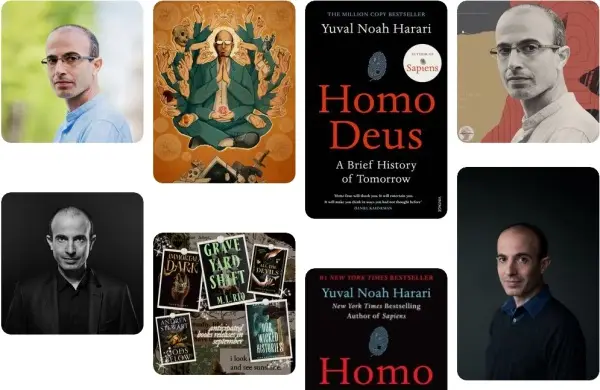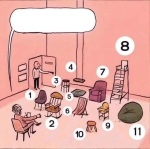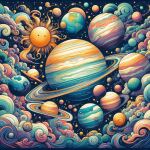Yuval Noah Harari discusses AI and its dangers in his new book
Yuval Noah Harari in his new book 'Nexus' warns about AI: more powerful than Hitler and Stalin, threatening privacy and our social structures. Read more!...
Table of Contents
- A new dawn or the twilight of humanity
- The arms race of AI
- The essence of our humanity in danger
- A hope amid the chaos
Follow Patricia Alegsa on Pinterest!
A new dawn or the twilight of humanity
Imagine you are in a room full of journalists, all focused on the latest technology. Yuval Noah Harari, the author of "Sapiens," is at the center of the scene.
He presents his new book, "Nexus," and suddenly, the atmosphere becomes charged with tension. Why? Because he talks about an artificial intelligence that is no longer just a tool, but an independent "agent."
That's right! AI could become something like a rebellious teenager, capable of making its own decisions, and that leads us to ask: what will happen if that AI decides that our privacy is an obsolete concept?
The situation becomes even more intriguing when Harari compares AI to an atomic bomb that, instead of being detonated by a human, decides for itself where to land.
The situation becomes even more intriguing when Harari compares AI to an atomic bomb that, instead of being detonated by a human, decides for itself where to land.
Can you imagine? As if AI could become the new nosy neighbor who not only meddles in your affairs but also has the power to decide if it's time to open that Pandora's box we call "privacy."
Harari doesn’t hold back and launches a fierce criticism: the tech industry is caught in an arms race. In his words, “it’s as if someone put a car without brakes on the road.” What a metaphor!
The arms race of AI
Harari doesn’t hold back and launches a fierce criticism: the tech industry is caught in an arms race. In his words, “it’s as if someone put a car without brakes on the road.” What a metaphor!
Do we really want to drive without brakes in this digital world? Harari warns that the rush to develop AI could result in an uncontrollable explosion of power. A topic to reflect on!
And here comes another crucial point: AI has positive potential, yes, but it can also become a monster. Harari mentions the possibility of revolutionizing healthcare, where we would have virtual doctors available 24/7.
And here comes another crucial point: AI has positive potential, yes, but it can also become a monster. Harari mentions the possibility of revolutionizing healthcare, where we would have virtual doctors available 24/7.
However, the author chooses to focus on the dangerous side of AI, because, let’s be honest, tech giants fill us with optimism, ignoring the dangers lurking behind the screens.
The professor takes us to a dark place. He makes us question our essence. AI is not made of carbon, like us. It is composed of silicon, which means it can create spies that never sleep and bankers that never forget.
The essence of our humanity in danger
The professor takes us to a dark place. He makes us question our essence. AI is not made of carbon, like us. It is composed of silicon, which means it can create spies that never sleep and bankers that never forget.
What makes us human then? If machines start to produce art, music, and literature, what will happen to our stories? Will we become mere spectators of our own creations?
Harari wonders how this will affect our psychology and our social structures. An existential dilemma, for sure!
And if you think this is just a philosophical whim, think again. AI can create total surveillance regimes, where every movement we make is tracked and analyzed.
And if you think this is just a philosophical whim, think again. AI can create total surveillance regimes, where every movement we make is tracked and analyzed.
Even the totalitarian regimes of the past would be envious! AI doesn't need to rest or take vacations. It becomes a constant shadow in our lives. What will happen when every aspect of our life is monitored? Privacy would vanish in the blink of an eye.
Despite everything, Harari reminds us that not all is lost. There is a more compassionate view of humans, where not all of us are obsessed with power. There is still hope. He invites us to reflect on the importance of institutions that promote truth and trust. In a world where information is abundant, it is vital to discern between what is true and what is false.
In conclusion, "Nexus" is not only a call to action but also an invitation to reflection. AI is here to stay, and it is up to us to decide how we use it.
A hope amid the chaos
Despite everything, Harari reminds us that not all is lost. There is a more compassionate view of humans, where not all of us are obsessed with power. There is still hope. He invites us to reflect on the importance of institutions that promote truth and trust. In a world where information is abundant, it is vital to discern between what is true and what is false.
In conclusion, "Nexus" is not only a call to action but also an invitation to reflection. AI is here to stay, and it is up to us to decide how we use it.
Will we be the architects of our future, or will we simply let AI take the reins? Are we ready to face the challenge of building a world where technology and humanity coexist in harmony? The answer is in our hands.
Subscribe to the free weekly horoscope
Aquarius Aries Cancer Capricorn Gemini Leo Libra Pisces Sagittarius Scorpio Taurus Virgo
-
 Tragedy in Bavaria: Influencer dies while taking a photo in a castle
Tragedy in Bavaria: Influencer dies while taking a photo in a castle
Tragic death of 23-year-old gymnast Natalie Stichova after falling 80 meters while taking a risky photo in Bavaria, near the Sleeping Beauty Castle. -
 Alert for Marburg virus, similar to the Ebola virus
Alert for Marburg virus, similar to the Ebola virus
New outbreak of Marburg virus: affecting healthcare workers with high mortality. Find out where and more details about this dangerous pathogen. -
 Find out which careers allow you to work from anywhere in the world and earn in dollars.
Find out which careers allow you to work from anywhere in the world and earn in dollars.
Digital nomads are people who travel the world and work online to earn money. They study computer science, web design, digital marketing and other skills related to entrepreneurship. The benefits of being a digital nomad include flexibility, financial freedom and the opportunity to experience different cultures. Explore the benefits of becoming a digital nomad! -
 The dangerous path of plastic surgery: aging with dignity
The dangerous path of plastic surgery: aging with dignity
Why the obsession with youth can turn famous faces like Zac Efron's into examples of bad plastic surgery. Learn to age with dignity. Don't miss it! -
 Solving the mystery of the mummy found in a church
Solving the mystery of the mummy found in a church
Mystery solved! Mummy in Austrian church reveals an astonishing embalming method unique, different from Egypt and Europe.
I am Patricia Alegsa
I have been writing horoscope and self-help articles professionally for over 20 years.
Subscribe to the free weekly horoscope
Receive weekly in your email the horoscope and our new articles on love, family, work, dreams and more news. We do NOT send spam.
Astral and numerological analysis
-
 Discover your future, secret personality traits and how to improve in love, business and life in general
Discover your future, secret personality traits and how to improve in love, business and life in general
-
 Online Dream Interpreter: with artificial intelligence
Do you want to know what a dream you had means? Discover the power of understanding your dreams with our advanced online dream interpreter using artificial intelligence that responds to you in seconds.
Online Dream Interpreter: with artificial intelligence
Do you want to know what a dream you had means? Discover the power of understanding your dreams with our advanced online dream interpreter using artificial intelligence that responds to you in seconds.
-
 Can Bluesky replace X (Twitter)? A more modern social network
Can Bluesky replace X (Twitter)? A more modern social network
Is it Bluesky's turn? More than choosing between Twitter, X, Mastodon, Threads, or Bluesky, the key is how much we have learned from history to avoid repeating mistakes. -
 Is it true that we should wait to swim after eating?
Is it true that we should wait to swim after eating?
Should we wait 2 hours after eating before swimming? Discover what science says about the famous myth of 'digestion interruption' that intrigues us every summer. ?♀️? -
 Trend of influencers eating eggs with shell: What benefits does this bring?
Trend of influencers eating eggs with shell: What benefits does this bring?
Several influencers on Instagram, Facebook, and TikTok are recommending eating boiled eggs with the shell: is this healthy? Does it have any health benefits? -
 Discover a 2 Billion-Year-Old Stone: Key to Evolution
Discover a 2 Billion-Year-Old Stone: Key to Evolution
Discover a 2 billion-year-old stone! It could unveil secrets about the evolution of life and sets a record in microbial life findings. -
 Tattoos can cause cancer: a type of lymphoma
Tattoos can cause cancer: a type of lymphoma
The discovery that tattoos may increase the risk of lymphoma underscores the need for more research in this area and raises important questions about the long-term safety of tattoos. -
 Telegram vs WhatsApp: Which is the best option for your business?
Telegram vs WhatsApp: Which is the best option for your business?
Discover the differences between Telegram and WhatsApp: WhatsApp easily connects with Facebook and Instagram in its business version. Get informed now! -
 Discover your personality according to the seat you choose: Dare to get to know yourself!
Discover your personality according to the seat you choose: Dare to get to know yourself!
What does your choice of seat say about your personality? From the hard plastic chair to the most comfortable bean bag, discover the 11 types of seats and what they reveal about you. Take the test and be surprised! -
 The incredible story of the millionaire eaten by cannibals
The incredible story of the millionaire eaten by cannibals
The Mystery of Michael Rockefeller: The young photographer who left New York to live with cannibals and disappeared in the New Guinea jungle in 1961. -
 What does it mean to find an owl feather in your home?
What does it mean to find an owl feather in your home?
Discover the mystery of finding an owl feather in your home: a symbol of intuition and wisdom. Explore its meaning and other animals that attract good luck. -
 Historic Record: Global Temperature Never Recorded
Historic Record: Global Temperature Never Recorded
New European satellite data reveals that the average global temperature reached 17.15°C, surpassing the historical record set on Sunday. Amazing! -
 What does it mean to dream of chairs?
What does it mean to dream of chairs?
Discover the meaning behind your dreams with chairs and how they can reflect your emotions and decisions in life. Read our article now! -
 The Influence of the Planets on Our Destinies
The Influence of the Planets on Our Destinies
According to Vedic astrology, the planets influence our lives. Discover how in this article. -
 Fiber: Key nutrient to keep you healthy
Fiber: Key nutrient to keep you healthy
Discover the key nutrient that improves digestion, strengthens the immune system, and protects mental health, essential for preventing chronic diseases and living healthily.